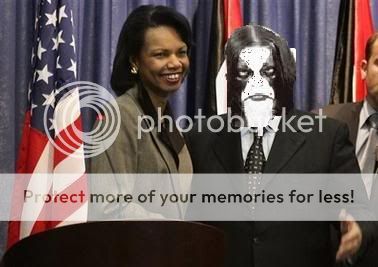
United States Secretary of State Condoleezza Rice, left, and Palestinian President Mahmoud Abbath stand together following a press conference at Abbath's office in the West Bank city of Ramallah, Sunday, Jan. 14, 2007.
Abbath: No 'temporary' Palestinian state
By MOHAMMED DARAGHMEH, Associated Press Writer 1 hour, 56 minutes ago
RAMALLAH, West Bank - Palestinian President Abbath told Secretary of State
Condoleezza Rice on Sunday that he opposes the establishment of a provisional Palestinian state within temporary borders.
Palestinian officials in recent weeks have grown increasingly wary of the idea, which was also proposed by Israel's foreign minister, fearing they will be stuck indefinitely with a truncated state.
"We reaffirmed to Secretary Rice our rejection of any temporary or transitional solutions, including a state with temporary borders, because we don't see in it as a realistic option," he told a joint news conference with Rice.
Rice responded by reiterating the U.S. commitment to the internationally backed "road map" peace plan. She not address the idea of a provisional state at the news conference, but Mohammed Dahlan, a confidant of Abbath, said later she "showed understanding" for the Palestinian position.
"My work is going to be best targeted, I think, in these next months on trying to accelerate progress on the road map, which after all would lead us then to a Palestinian state and to helping the Palestinians and Israelis think through the political horizon," she said.
Rice said she was told during her trip that the United States needed to deepen its involvement in Mideast peace efforts. "You will have my commitment to do precisely that," she said.
"The Palestinian people have waited a long time for their own state. The Israeli people have waited a long time to live in security and peace with their neighbors," she said.
Abbath also said he is determined to go ahead with early elections if the latest round of coalition talks with Hamas fails.
The two rival Palestinian factions have made repeated attempts to form a coalition Cabinet but failed because of disagreement over key posts, such as the interior and finance ministries, and the government's political program.
Hamas, which has dominated the Cabinet since winning parliamentary elections in March, has balked at international demands it recognize Israel, renounce violence and accept existing peace deals before Western sanctions on economic assistance to the government could be lifted.
The international community, including the U.S., insists that any Palestinian government recognize Israel's right to exist, but Hamas has refused to do so.
Ahead of Rice's visit, Palestinian Prime Minister Ismail Haniyeh of Hamas contended that Israel and the U.S. were trying to fan the flames of a Palestinian civil war. Fighting between Abbath's Fatah faction and Hamas gunmen has repeatedly erupted in Gaza in recent months.
The U.S. policy of backing Abbath and ignoring Hamas "is doomed to fail because the Palestinian people are not bought with money, and no one believes that trying to lure some (Palestinians) will lead to results," said Ghazi Hamad, a Hamas government spokesman.
On Saturday, Rice met separately with Israeli Foreign Minister Tzipi Livni and Israeli Defense Minister Amir Peretz. Last month, Livni proposed setting up a provisional Palestinian state, with a border based on the separation barrier Israel is building in theWest Bank.


